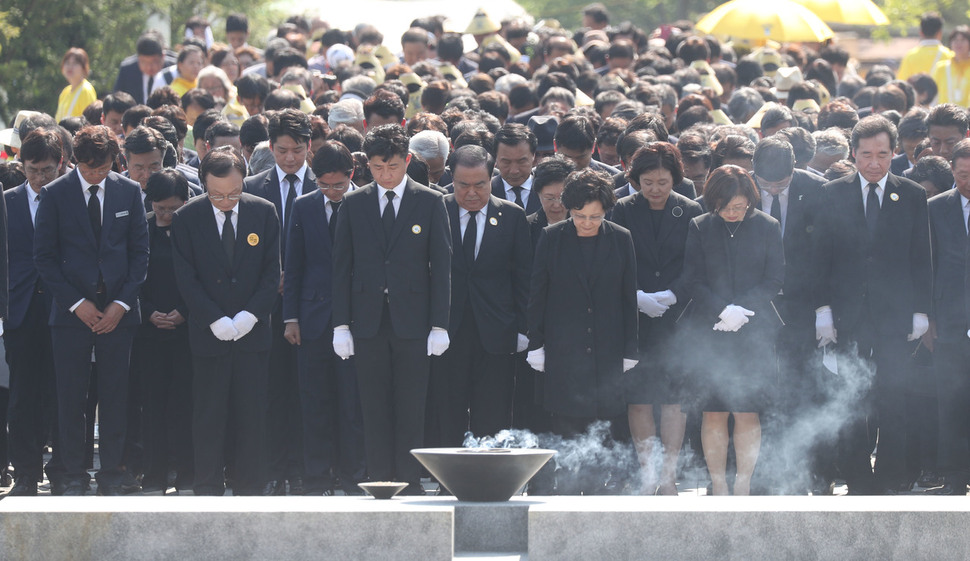 |
|
The commemorative ceremony for the 10th anniversary of former President Roh Moo-hyun’s death on May 23 in Bongha Village, South Gyeongsang Province. (Blue House photo pool)
|
2 years into term, Moon hobbled by same obstacles that hindered Roh Moo-hyun
“While there’s a lot this administration hasn’t done very well, isn’t it right to focus on redistributing more with the lower class? For decades, now, the income of the companies and the wealthy has shot up, while the income of workers and the lower class has stagnated. Just because a few policies are problematic doesn’t mean we upset the applecart. That would ultimately mean going back to the era of Lee Myung-bak and Park Geun-hye. It’s awful just to think about that. I want this administration to do well, so that I can keep living under a liberal government.” This is something a friend of mine said over some drinks not long ago. The remarks were ordinary, but honest. They were not warmly welcomed by the other people at the gathering, however, who immediately shot back with heated objections. “What are you talking about?” “Are you calling for socialism?” “At this rate, Moon is going to be trounced in the parliamentary elections.” For quite a while now, I guess, South Korean President Moon Jae-in and his administration have served as a popular punching bag during drinking sessions. Generally speaking, my fellow drinkers were the kind of people who would have voted for Moon in the last presidential election or, at the very least, wouldn’t have voted for Hong Jun-pyo. I suddenly found myself thinking that this was how Roh Moo-hyun had been ostracized nearly two decades ago. Moon is in basically the same situation. He had pledged to surpass Roh, but at the moment, there’s no guarantee that he’ll be able to. While I was on my way home after the gathering, I found myself asking the fundamental question of whom the “candlelit government” belongs to. It’s often said that the future of the candlelit revolution rests on the shoulders of a single person, Moon Jae-in. There’s a tendency to think of the candlelit government as consisting of Moon and his advisors. Politicians, journalists, activists, and academics all want the president to be some kind of all-knowing and all-powerful candlelit wizard. But that’s neither desirable nor feasible. Such expectations inevitably lead to disappointment and disillusionment. The candlelit revolution will be carried forward by ordinary people alone, as it has been from the very beginning. Without a doubt, the agents of the revolution are each and every one of the people who lifted a candle (during the demonstrations against Park Geun-hye). The candlelit government belongs to those people — to us. And since the government was brought into being through an election, it also belongs to all Koreans. Now that the Moon administration has passed its second anniversary, some progressive and reform-minded scholars have criticized the current administration for not following through on its duties as the candlelit government. In an abstract sense, they’re not wrong. But perhaps that criticism derives from excessive expectations about the candlelit government, expectations that fail to take into account several aspects of a complicated reality. The chaebol and the far right remain very powerful in Korean society, their power rooted in the division of the Korean Peninsula. Under such circumstances, a liberal government is forced to inch its way uphill. Any attempt to do something, either in the economy or foreign policy, is hobbled by a host of practical obstacles. A pragmatic intellectual ought to make a cool-headed assessment of the actual circumstances and take the lead in forging a trail, so that we can move forward, one step at a time. Time and time again, the press and the political establishment have blamed the president, to an exhausting degree. Whether things go poorly or go well, it’s always the president’s fault. Every day, newspapers devote extensive coverage to a few policy errors, as if the country were going down the tubes. Moon became the president after pledging to reduce inequality; urging him to drop that platform is akin to calling for his resignation. It’s time for a change, both from politicians and the press. Power to change ultimately lies within the people, not the president It’s the ordinary people who are quietly working on their candlelit mission in their everyday lives. They take responsibility for bringing issues to public attention and pushing them forward, and they don’t waste any opportunities to assert their sovereignty. Rather than blind and uncritical subservience, they aim for rational and alternative criticism and participation. While the host of the interview with Moon on his second anniversary may have come across as immature and unprepared, there wasn’t any reason to castigate her. Needless to say, Moon faces an immense responsibility. Though he has worked hard, with little rest, for the past two years, he hasn’t been able to sustain the glow of the candlelit government that he enjoyed in the initial period of his administration. I think that Moon, too, ought to take his share of the blame before he dishes it out to others. Perhaps he could make a public accounting of missteps in major policies before moving on.
 |
|
Back Ki-chul, editorial writer
|







